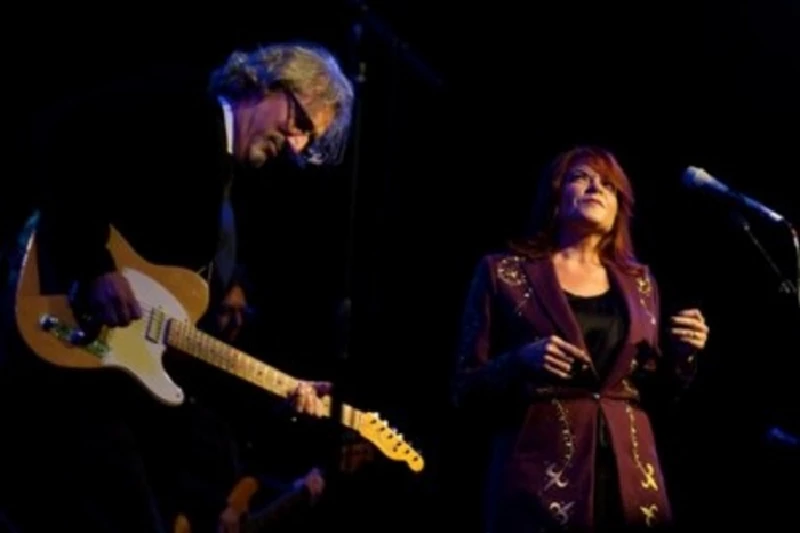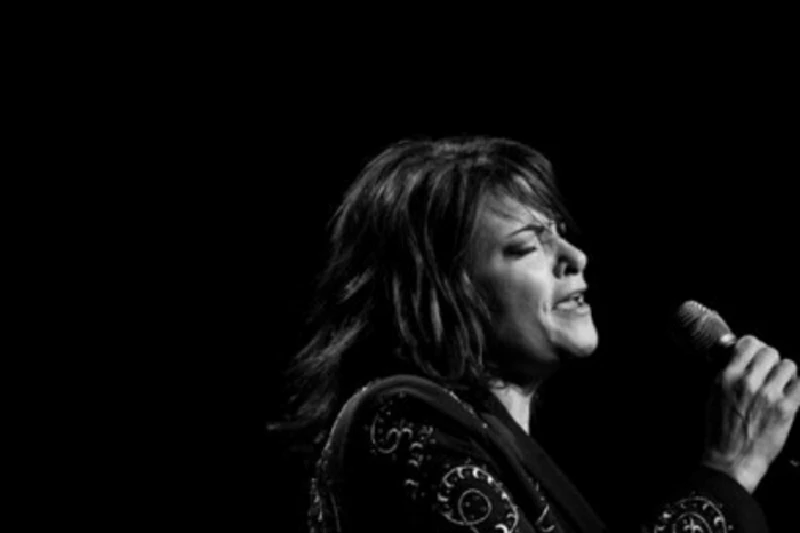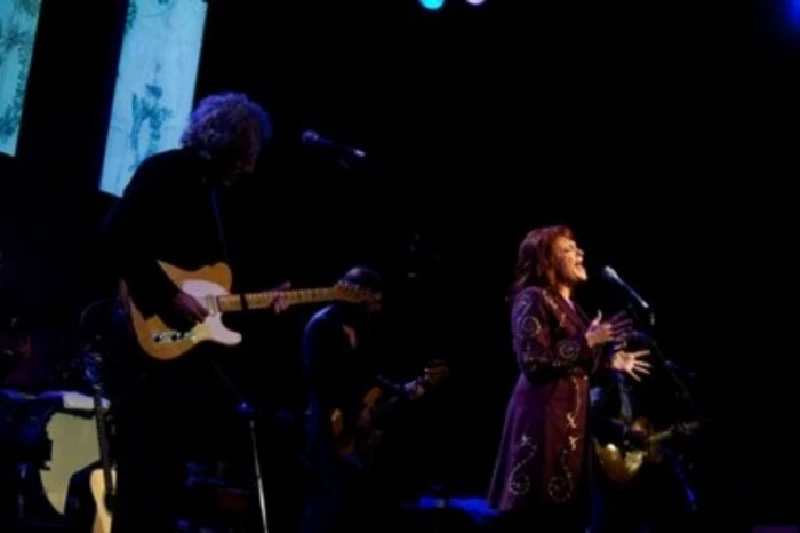Bad Acid - Harris Theatre, Chicago, 29/1/2010
by Lisa Torem
published: 31 / 1 / 2010

intro
At the Harris Theatre in Chicago, Lisa Torem watches Rosanne Cash play a spectacular set of country rock, many of which were taken from her recent album 'The List', which takes its name from a list of 100 classic country songs that her father Johnny Cash gave to her as a girl
Rosanne Cash is queen. She’s queen of the road and queen of the voice that sucks the sweetness out of the purest of lyrics. Cash, like a royal, with specks of red in her long hair, is confident, but approachable. From the first moment, you “get” that she belongs on stage. But, you also “get” that her place in this world required respecting those that came before her. Tonight, at Chicago’s downtown, softly lit Harris Theatre, Cash honours the list which her illustrious father Johnny Cash lovingly crafted for her. He had said, while handing over this list of 100 classic country songs, “This is your education.” At the time, the younger Cash hadn’t thought of recording a tribute to that list, but eventually the thoughts flourished; hence her recent recording ‘The List.’ The night’s songs consisted primarily of those from ‘Black Cadillac’ and ‘The List.’ Cash wore a burgundy top with sheer sleeves, black boots and a billowy black skirt; the kind that might be worn by a classical Flamenco dancer. Images projected against the stage wall frequently changed according to the themes of the repertoire. With her was her 57th Street, New Yorker. bespectacled husband, producer John Leventhal. With his guitar slung around his neck, the lone gray-haired gunslinger, sometimes allowed Cash to reign, as he watched with reverence from a stool. But mostly, he provided extremely spot-on arrangements and pleasant harmonies. At times, Cash would flash him a smile when his chameleonic playing strongly resembled that of Cash senior. The familiar chug, which made Johnny Cash famous, rang out more often than once. (Legend has it that Cash originally had stuffed a dollar bill under the strings, during a Sun Studio session, to achieve that muffled effect.) The first cut, ‘Moving On’ was lively. "You’ve broken your vows and it’s all over now," Cash enunciated clearly with her cutting contralto. Leventhal played whining, sliding, riffs as the story continued on. "Flying too high for my little sky and I’m moving on," flailed Cash’s pipes. The Django Reinhardt swinging swashbuckling verve of ‘Miss The Mississippi and You’ followed. Brandishing a more reflective tone, Cash spun, "Roaming the wide world over, always alone and blue." Visuals of birds carrying blossoms in their beaks illuminated the stage wall. Cash introduced ‘Long Black Veil’ by stating, “There’s no American folk music without this song.” Alongside a bittersweet melody, Cash sings, “She walks these hills with a long, black veil/Nobody knows, nobody sees, nobody knows but me.” On the recording, Jeff Tweedy adds harmonies. Cash made some acerbic comments about Tweedy and Norah Jones – both engaged in the Grammy process currently. “I love Norah, but she’s had enough, dammit,” sneered Cash, to which the crowded house tittered. And, to milk the effect, she added, “Tonight the part of Bruce Springsteen will be played by John Leventhal.” But the great equalizer was ‘Sea of Heartbreak’ which has been nominated for a songwriting Grammy. This ballad about losing in love has beautiful sentiments and sighs throughout the audience were strongly felt. A song which can’t be traced back to its composer,’Motherless Children’ was wrapped in simplicity and resembled a hymn or spiritual. Then, ‘Heartache By the Number’ (Harlan Howard) kicked off. My only regret was that Cash looked a little too jovial up there as she swung her arms and swivelled her skirt. Is this simply an ‘attitude song’ or did I get the story wrong? (Interestingly, Elvis Costello, joined her on the recording. ‘The List’ involved the collaboration of many talented counterparts). ‘Runaway Train’ included the bruising phrases, "blind boys and gamblers invented the blues" and more. Leventhal tailgated the melody with an almost baroque finesse. Then, Cash picked up her own guitar. engaging in flagrant strums, while Leventhal played more cachunk. He added some Polynesian touches and stopped on a dime at the songs end. The plucky intro to ‘Radio Operator’ gave way to Leventhal’s use of high-end notes. Cash hung on to the final note which was warm and savoury. A few minutes dragged on while Cash struggled to tune her guitar. Leventhal grabbed it and tried his hand, while the duo exchanged some marital banter. “See what I have to deal with,” he groaned. A visceral Steve Goodman song followed; Cash announced that the late Chicago-based iconic songwriter’s mother was in the house. "I’m not a rainbow in the dirt/I’m not a mirror in the hall," Cash exclaimed. "I will look for you in morphine dreams," she lamented. Leventhal and Cash both sang and played guitar, deftly balancing their positions on stage. Leventhal slightly upstages Cash at times, but mostly their deliveries align. A long bluesy outro provided a glossy finish to a classic. Next, Cash sashayed to ‘Tennessee Flattop Box’ where Leventhal pulled a virtual Cash- cloned arrangement from his arsenal. “This man’s a native New Yorker,” she smiled, as he made the guitar sound like a siren on a lonesome highway or a creaky locomotive. “You grow ‘em smart here,” laughed Cash, referring to the “tall lanky guy” Chicago sent to Washington.” The crowd ate up the personal comments Cash lavished on this cold night. For me, the pin-drop moment came when Cash sang a song not on 'The List.' Originally recorded by American singer Bobby Gentry, ‘Ode To Billie Joe’ was downright spectacular. From the sour drone of Leventhal’s instrument to Cash’s showcasing of the dark, mysterious, but folksy lyrics, every nuance was masterfully executed. Then, ‘Girl From The North Country’, which was originally recorded by her father and Bob Dylan in 1963, boomeranged this thread of balladry. Carter thanked Helen Carter for passing down so many of these well-respected tunes and then launched into the desolate landscape of ‘Bury Me Under The Weeping Willow.’ After walking off stage, the pair received an overwhelmingly enthusiastic standing ovation. Cash walked back on, practically blushing, and warmly asked, “Any requests?” She honoured the voice of one in the crowd who requested, ‘If I Were A Man.’ Then, turned to Leventhal and said, “Do you remember this really?” After a few chuckles from the audience and some more industrious tuning, Cash thanked the audience for being so patient. "If I were the moon, I’d hang so low…," moaned Carter. The low bass of Leventhal’s guitar throbbed in the background. “Somebody sounded like they really wanted it,” Cash declared, after settling on, ‘Blue Moon.’ ‘What would I give to be a diamond in your eyes again?” she sang softly, drizzling the words with sanguine vocal teardrops. The third encore included the lyric, "the flames in our souls will never burn out," and made excellent use of Cash’s stellar upper register. The audience seemed appreciative of the generous encores and quietly left the stadium. Over all, Leventhal and Cash, through the use of simple textures, harrowing lyrics and heartrendering vocals, made sure those attended witnessed a crowning glory of a night.
Picture Gallery:-


most viewed articles
current edition
Spear Of Destiny - InterviewRobert Forster - Interview
Fiona Hutchings - Interview
When Rivers Meet - Waterfront, Norwich, 29/5/2025
Carl Ewens - David Bowie 1964 to 1982 On Track: Every Album, Every Song
Brian Wilson - Ten Songs That Made Me Love...
Chris Wade - Interview
Pistol Daisys - Waterfront, Norwich, 29/5/2025
Credits - ARC, Liverpool, 17/5.2025
Nils Petter Molvaer - El Molino, Barcelona, 24/4/2025
previous editions
Heavenly - P.U.N.K. Girl EPBarrie Barlow - Interview
Boomtown Rats - Ten Songs That Made Me Love....
Oasis - Oasis, Earl's Court, London, 1995
Dwina Gibb - Interview
Beautiful South - Ten Songs That Made Me Love...
Sound - Interview with Bi Marshall Part 1
Manic Street Preachers - (Gig of a Lifetime) Millennium Stadium, Cardiff, December 1999
Trudie Myerscough-Harris - Interview
Serge Gainsbourg - Ten Songs That Made Me Love...
most viewed reviews
current edition
Peter Doolan - I Am a Tree Rooted to the Spot and a Snake Moves Around Me,in a CircleGarbage - Let All That We Imagine Be The Light
Vinny Peculiar - Things Too Long Left Unsaid
Little Simz - Lotus
John McKay - Sixes and #Sevens
Suzanne Vega - Flying With Angels
HAIM - I Quit
Vultures - Liz Kershaw Session 16.06.88
Billy Nomates - Metalhorse
Eddie Chacon - Lay Low
Pennyblackmusic Regular Contributors
Adrian Janes
Amanda J. Window
Andrew Twambley
Anthony Dhanendran
Benjamin Howarth
Cila Warncke
Daniel Cressey
Darren Aston
Dastardly
Dave Goodwin
Denzil Watson
Dominic B. Simpson
Eoghan Lyng
Fiona Hutchings
Harry Sherriff
Helen Tipping
Jamie Rowland
John Clarkson
Julie Cruickshank
Kimberly Bright
Lisa Torem
Maarten Schiethart